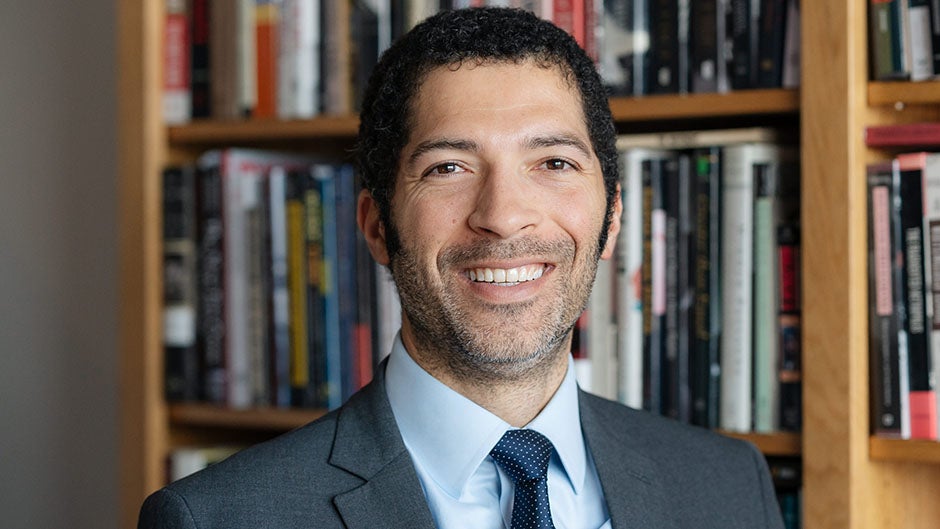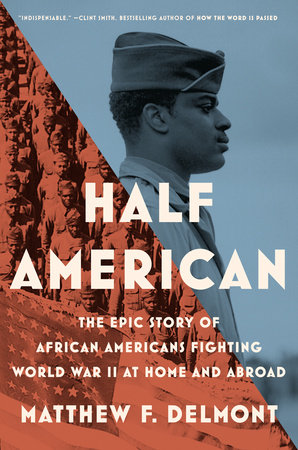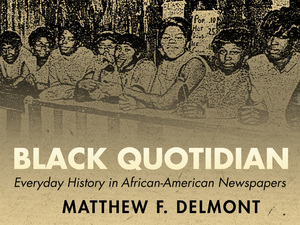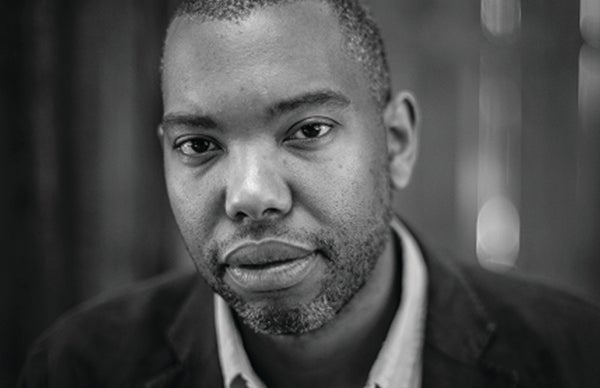Dr. Matthew Delmont
Expert on African American history and author of Half American
Photo taken by Eli Burakian
-
About Matthew Delmont
Through his research, Dr. Matthew Delmont examines the history of racial platitudes– how Americans talk about race without doing anything about racism–that traces back to the World War II era, the importance of Black newspapers, which served as vital forerunners of today’s social media activism, and racist school policies and how they affect school segregation to this date. He also looks at how the resurging celebration of a day such as Juneteenth (June 19 commemorates the end of slavery in the United States) speaks to the country’s larger moment of reckoning.
Dr. Matthew Delmont is the author of Black Quotidian: Everyday History in African American Newspapers and Half American: The Epic Story of African Americans Fighting World War II at Home and Abroad. He was inspired by the Black Lives Matter movement to showcase the historical value of the stories of both famous and ordinary Black Americans. The result, Black Quotidian, is an archive of digitized Black American newspapers that examines the everyday lives of Black Americans in the twentieth century. Much like The 1619 Project by Nikole Hannah-Jones, Black newspapers allowed readers to learn, study, and teach Black history year round, not just in February. Black Quotidian won the American Studies Association’s Garfinkel Prize for its exceptional work at the intersection of American Studies and Digital Humanities. In his book, Half American, Dr. Delmont analyzes the history of Black Americans who fought bravely abroad in a segregated military during World War II, and returned home to battle white supremacy in America. Half American has been awarded Anisfield-Wolf Book Award for non-fiction.
Dr. Matthew Delmont is the Sherman Fairchild Distinguished Professor of History at Dartmouth College. He is a frequent contributor to The New York Times, The Atlantic, Washington Post, and NPR, among several other academic journals. Dr. Delmont graduated from Harvard University, and earned his Master’s and Ph.D. from Brown University. At Dartmouth College, he serves as an advisor to the President for faculty diversity. Prior to Dartmouth College, Dr. Delmont taught at Scripps College, where he was awarded 2011 Professor of the Year, and was the Director of the School of Historical, Philosophical, and Religious Studies at Arizona State University. He was awarded with a Guggenheim Fellowship in 2017 and a National Endowment for the Humanities (NEH) Public Scholar Award in 2020.
Contact us for more information about booking Dr. Matthew Delmont for your next event.
-
Speaking Topics
The Past and Future of Black History Month
Started nearly one-hundred years ago, Black History Month has changed how generations of Americans learn about the nation's past and has elevated figures such as Martin Luther King Jr., Rosa Parks, and Harriet Tubman into the pantheon of American icons. Drawing on his award-winning digital book Black Quotidian, historian Matthew Delmont argues that the time is ripe for a fresh approach to Black History Month. He highlights hidden figures from Black history and explains why this history should be studied and celebrated not only in February but all year round.
Half American: The Epic Story of Black Americans Fighting World War II at Home and Abroad
For Black Americans World War II was about not only America’s standing in the world but also about how much actual freedom would exist in the United States. Black troops were at Normandy, Iwo Jima, and the Battle of the Bulge. They fought bravely in combat and they formed the backbone of the United States military’s supply effort, enabling the Allies to fight and win a global war. They did all of this while fighting in a segregated military. Black veterans returned from the war and kept fighting white supremacy at home, fueling the civil rights movement. Drawing on his upcoming book, historian Matthew Delmont explains how World War II raised questions regarding race and democracy that remain unanswered more than seventy years later. This is an inspiring history of bravery and patriotism in the face of unfathomable racism.
Juneteenth: Celebrating Black Heritage and Liberation
Juneteenth (June 19) commemorates the end of slavery in the United States. Throughout the country more and more companies and communities are observing Juneteenth as a celebration of freedom. In this lecture, Dr. Matthew Delmont highlights how these celebrations honor the legacy of slavery, Black liberation, and African American history while speaking to the country’s larger moment of reckoning.
-
Video
-
Praise for Matthew Delmont
Engaging, intellectual, thorough.
— Cuyahoga Community CollegePraise for Half American
When I first learned about World War II, little was said about the role Black Americans played in the war effort. I wish Half American had been in my classrooms. Matthew F. Delmont’s book is filled with compelling narratives that outline with nuance, rigor, and complexity how Black Americans fought for this country abroad while simultaneously fighting for their rights here in the United States. Half American belongs firmly within the canon of indispensable World War II books.
— —Clint Smith, author of How the Word Is Passed: A Reckoning with the History of Slavery Across AmericaMatthew F. Delmont’s Half American is a bold, searing, and moving account of the courageous Black men and women who served during World War II. While their stories and contributions are too often sidelined in American popular narratives, Delmont’s brilliant book skillfully weaves together insights from an array of archival records and military documents to place Black Americans at the center of the story. With rigor, passion, and depth of analysis, Delmont compellingly demonstrates that Black participation was absolutely essential to American victory during World War II. This is a must-read for anyone interested in race, American democracy, and military history.
— Keisha N. Blain, coeditor of Four Hundred Souls and author of Until I Am Free: Fannie Lou Hamer’s Enduring Message to AmericaMatthew F. Delmont has opened up the conversation about World War II and civil rights in this artfully written book about the nuanced and complex relationship between Black soldiers and war supporters and visions of freedom abroad and at home. Through an absorbing series of narratives, Delmont reconsiders previously held notions of heroism to not only include the Black fighters often left out of stories of World War II, but he also includes the myriad of Black workers who staffed the nation’s military industries and were subjected to racist attacks as they toiled. A brilliant piece of history, Delmont has ultimately challenged and transformed the definition of the Greatest Generation.
— Marcia Chatelain, Pulitzer Prize–winning author of Franchise: The Golden Arches in Black AmericaMatthew F. Delmont has written a remarkable account of the shockingly oppressive conditions that African Americans—from the Tuskegee Airmen, to the men of the 92nd Infantry, to Black Marines—experienced during and after World War II. His research and ability to so eloquently describe those circumstances and the remarkable contributions that these men and women made in achieving our historic victories in Europe and Asia make this book a very compelling read. It ought to be mandatory reading for every member of Congress.
— Tom Daschle, former Senate majority leaderThis is an engaging, inspiring, and elegantly written history of the African American experience in World War II. Matthew F. Delmont illuminates the complex story of the two-front war fought by African Americans at home and abroad. Because of segregation and racism at home, Delmont shows how the ’Half Americans’ were among the first to see the war as an existential struggle between forces of fascism pitted against the forces of freedom, democracy, and human rights—both domestically and globally. And Delmont never loses sight of the personal acts of courage, sacrifice, and patriotism that persevered despite harsh racial discrimination in wartime. This is an important book about what we can learn from African Americans in World War II—the warriors, the journalists and poets, leaders and home-front workers. A page-turning must-read!
— Dr. Gordon “Nick” Mueller, president and CEO emeritus, The National WWII MuseumPraise for Black Quotidian
Turning Black History Month on its head, Matthew Delmont insists that black life is not and cannot be limited to big events, past greats, or historical study in specified time slots. Distinctive and unique, Black Quotidian provides students an opportunity to examine the nuances and complexities of black life inside and outside the classroom.
— —Nishani Frazier, Miami UniversityBringing attention to the under-recognized significance of the black press and its impact on everyday black peoples' lives, Black Quotidian explores new territory for digital history and the public humanities.
— Kim Gallon, Purdue UniversityPraise for Making Roots
Delmont builds his narrative from extensive archival research. His ability to describe these findings in an engaging style keeps the pages turning. Dramatic episodes come alive.
— Publishers WeeklyIn Making 'Roots,' Matthew Delmont gives us a terrific and highly readable account of the making of Alex Haley’s book–cum–television miniseries, which had a major impact on television and on the ways Americans imagined slavery and its legacies. This is a hugely welcome study, both for its detailed look at the history of Roots and for its many smart insights about race, representation, and visual media.
— Gayle Wald, author of It's Been Beautiful: "Soul!" and Black Power TelevisionIn his absorbing, behind-the-scenes account of the making of Roots, Matthew F. Delmont not only narrates the personal odyssey Alex Haley took in discovering—and imagining—his ancestral epic for a mass audience in the 1970s but also reveals in fascinating detail the powerful mix of emotional and economic forces that led to the creation of one of the twentieth century’s most indelible—and debated—renderings of slavery. Popular culture’s roots run through Roots, and, in giving us his history of this touchstone, Delmont has produced a scholarly touchstone himself.
— Henry Louis Gates Jr., Alphonse Fletcher University Professor, Harvard University, and host of the PBS series Finding Your RootsLong before over-the-counter DNA testing and hashtag history lessons, Roots was the connective tissue between America’s racial past and its hopes for a post-racial future. Roots also gave rise to one of the seminal cultural moments of twentieth-century America, which Matthew Delmont deftly excavates and illuminates in Making 'Roots,' a must-read book that demands a re-evaluation of Roots and its conjuror, Alex Haley.
— Mark Anthony Neal, author of Looking for Leroy: Illegible Black MasculinitiesFor millions of Americans, Roots established a new way of thinking about race and ethnicity in and long after the 1970s. Making 'Roots' is a prodigiously researched and immensely compelling account of book and miniseries, of author and culture industry—the roots and branches of a genre-defying, commercially blockbusting brand of history writing.
— Eric Lott, The Graduate Center, City University of New YorkFew people read Alex Haley's Roots nowadays, and fewer still watch the twelve-hour television miniseries. But in its time, Roots touched the lives of millions of Americans, black and white, and transformed the national conversation on race. In Making 'Roots,' Matthew Delmont offers the definitive history of the Roots phenomenon, casting fresh light not only on the text and television series but also on a germinal moment in American cultural history.
— James T. Campbell, author of Middle Passages: African American Journeys to Africa, 1787–2005Praise for Why Busing Failed
Meticulous and insightful. . . . Delmont’s critique is tough but fair.
— The Boston GlobeIn this important work, Matthew Delmont takes the biggest scapegoat for our failure to integrate our schools, and then systematically dismantles the story we thought we knew. Why Busing Failed dispels the all-too-convenient narrative about the disaster of busing as a tool for integration and instead shows that, as black activists noted decades ago, the problem was never the bus, it was us. Carefully researched and compellingly written, Why Busing Failed is an indictment of both politicians and mainstream news organizations that aided and abetted small numbers of white parents in shifting the national narrative of integration from a constitutional and moral imperative to an impossible inconvenience.
— Nikole Hannah-Jones, The New York Times MagazineBy looking at the antibusing uprisings that were presented in mainstream media, this recommended narrative presents civil rights through the lens of media studies and offers an entirely new way of seeing how recent history was written.
— Library JournalWhy Busing Failed is an ambitious and well-researched account of an important aspect of the struggle for racial and educational equality in the United States.
— Pacific Historical ReviewWith Why Busing Failed Matthew Delmont dispels the conventional wisdom on segregation and its convenient narrative of Southern demagogues and Northern heroes. In these pages is a thoroughly chronicled, frustrating history that establishes segregation as a national system and demonstrates its tragic impact upon American education today. This book should be required reading.
— Jelani Cobb, author of The Substance of Hope: Barack Obama and the Paradox of ProgressMatthew Delmont's brilliant study of 'busing' upends much of what we think we know about the media and the civil rights movement. If you want to understand where we are today in this country--and why school segregation is so ubiquitous and so accepted—read this book. 'Busing' didn't fail; our resolve to desegregate schools did. This may be the most important book you read this year.
— Jeanne Theoharis, Distinguished Professor of Political Science at Brooklyn College and author of The Rebellious Life of Mrs. Rosa ParksDelmont tells an eye-opening story of the struggle for school desegregation outside the South in the wake of the civil rights movement. The Southern campaign received at least moderately positive media coverage. But as Delmont reveals in this deeply researched and engagingly written history, the situation was very different in places like New York, Chicago, Pontiac, Michigan, and—most famously—Boston. Delmont shows how Northern anti-segregation activists were able to mobilize the 'busing' issue, along with the media strategies of the Southern civil rights movement, to generate sympathetic media treatment. This book provides a much-needed corrective to the enduring assumption that the American mass media were cheerleaders in the fight for racial equality in the 1960s and 70s.
— Aniko Bodroghkozy, author of Equal Time: Television and the Civil Rights MovementPraise for The Nicest Kids in Town
Lively and perceptive. . . . Delmont’s book offers a subtle, refreshingly interdisciplinary reading of Bandstand as a site of the civil rights struggles in Philadelphia.
— Brian Ward, American Historical ReviewThe Nicest Kids in Town counters the (false) mythology of American Bandstand with valuable descriptions of ‘forgotten’ cultural productions.
— Gayle Wald, George Washington University, Journal Of The Society For American Music (Jsam)The study illustrates how . . . nostalgic representations of the past . . . can work as impediments to progress in the present.
— Cbq Communication Booknotes QuarterlyExcellent. . . . Offers a valuable understanding of the . . . melding of African Americans into the national youth culture.
— ChoiceWell-researched, tightly-written. . . . Impressively bright, clear, and comprehensive.
— History News NetworkReveals a hidden history of racial segregation on the United States' first television program centered on the teenage population. . . . Provocative.
— Orange County Register -
Books by Matthew Delmont
-
Media About Matthew Delmont
Request Fees
and Availability
- 212 572-2013
- Matthew Delmont travels from New Hampshire














